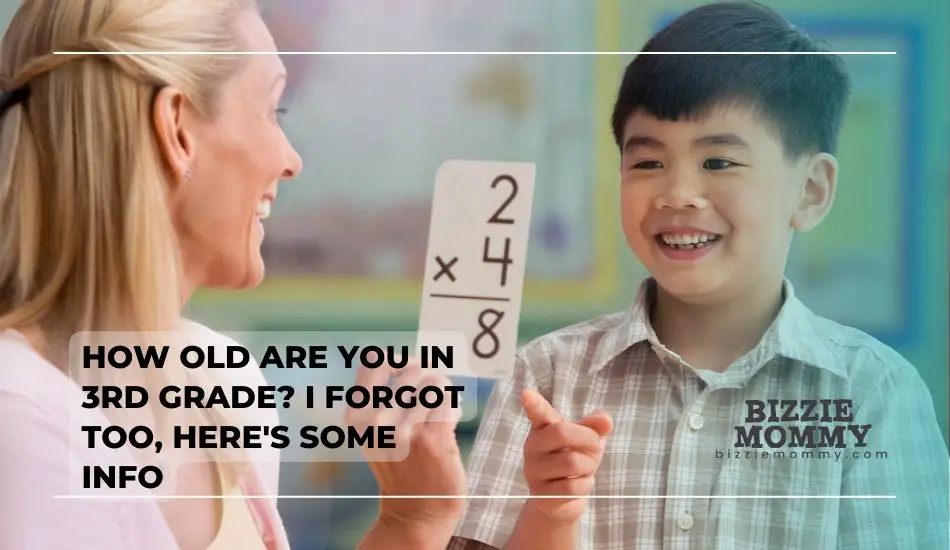Most parents hassle with deciding when their kids should begin their first school year after kindergarten. In many countries, and even states within a particular country, the age to begin first grade can vary.
Young children between the ages of one and three are classified as toddlers by the Centers for Disease Control and Prevention (CDC). Some believe that once your child reaches their first birthday, they are automatically considered a toddler. If you’re dealing with a two-year-old who throws tantrums, you’re in for a nasty shock.
In America, the average school-age child is seven to nine years old, depending on their the school district’s cutoff date and their birthdate. This indicates that the minimum age of third-graders is between 8 and 9. You may be concerned about your kid’s progress and age if they are about to be promoted to 3rd grade, commonly called grade 3 in most states. Academic standards and developmental milestones also help determine whether a child is ready for the challenges he might face as a third-grade student or if it is too early for him. Moreover, 3rd-grade students begin working more on understanding science and social studies concepts when they are about to reach fourth grade.
In addition, third-graders in school can efficiently read and write and perform math calculations without hassle. But that’s not all, the article below holds more details for you regarding this, so read on…
What Is The Perfect Age To Start School?
“How old are you in third grade?” is the common question many parents ask. Although many components affect the perfect age to start elementary school, we can get an idea of kids’ age to start their first grade in school.
Students begin third grade at 8 or 9 in most schools in America, but a child’s birthday also matters. Some students begin their first year at age 5; while others may join at age 6 or 7, influencing when they attend third grade.
Knowing your kid’s intelligence level to begin primary school when enrolling in kindergarten is important. A few third-grade students may require additional time to acquire basic skills before fully preparing for the third school year. Children need these abilities to do well, so every primary school provides prekindergarten programs nowadays.
One of the fundamental elements to take into account is the 3rd graders’ stage of development. Third graders vary in their ability to focus and maintain attention. The start of the school year at the appropriate time can impact a student’s academic success.
Many third-year students begin to enjoy learning problem-solving skills, working on their emotions, and other cognitive skills. These abilities, when developed, may benefit the students’ grades when the school year begins right after kindergarten.
When to start elementary school is a complex question, and there is no simple answer. Parents should examine their child’s aptitude in kindergarten and other intellectual activities before sending him to an elementary school. By doing this, parents may choose wisely when to begin their kid’s school year.
How Old Are You When You Start School?
The average American child enters school at six or seven, the perfect age to start school. Most third-grade students will be around the age of eight or nine. Their age may vary depending on where they live and when they begin school. A school year can be delayed if the kid is not mentally or emotionally prepared.
So, school readiness goes beyond age. The age at which 3rd graders are emotionally prepared for most schools may differ from when they are developmentally ready. Parents must consider the child’s abilities and needs when starting elementary school.
How Old Are You in 3rd Grade?
Parents have a big question, “Is my kid in the right grade?” which shows the importance of age in education cannot be overstated. They are curious about the age range of their kid in a particular school year, especially when it comes to early education.
For example, you might wonder, “how old are you in 3rd grade now?” The simple answer here is not simple. We all know by now that the average 3rd grader is between 8 and 9 years old, and other factors also play a role.
In most American school systems, third-grade students must reach a certain age by a certain date to be eligible to enroll in a particular class. For example, if the cutoff date for third-grade students enrollment is early September i.e, 1st September, a child who turns 8 years old on August 31st would be eligible to enter 3rd grade, while a child who turns 8 years old on September 2nd would have to wait a whole year to enroll.
Another factor influencing a child’s placement in third to fifth grade is academic progress. Some children may be held back a year if they struggle academically, while others may be accelerated if they show exceptional abilities. This can result in a wider range of ages within a class or a single grade level. This indicates that some children may be ready to enter third grade sooner depending on their academic ability.
What Milestones and Development an 8-9 Year Old Should Achieve?
The developmental milestones of 8-9-year-olds are critical in shaping their growth and future success. As they continue to grow and develop, they must be provided with the support and guidance they need to become confident, capable, and resilient individuals.
As your kid approaches the age of 8-9 years, they go through a phase of significant cognitive, physical, and emotional development. Various milestones shape their development at this stage and prepare them for life’s next stages.
Children’s motor skills have significantly improved at this age, and they can perform complex tasks such as riding a bike, tying their shoes, and playing team sports. They also begin to exhibit more coordinated and refined movements, allowing them to participate in activities that require more agility and balance.
Cognitively, children at this point are developing more sophisticated thinking skills, including the ability to make logical conclusions. They have better problem-solving skills and can understand more abstract concepts and simple words.
Moreover, they continue to improve their reading and writing skills, text comprehension, understanding of mathematical terms, and expression of themselves more fluently. Regarding emotional development, 8-9-year-olds are learning to control their emotions and impulses and develop empathy for others.
Social norms become more apparent to them, and they may struggle with peer pressure and social anxiety. They develop a sense of identity and self-esteem as they navigate complex and healthy social relationships.
Why Are Some Kids Older and Some Younger in 3rd Grade?

For third-grade students, the minimum age ranges from eight to ten. However, some kids may appear older or younger than their classmates within the same grade. This can be because of various biological and environmental factors.
Biologically, kids develop at different rates. Some kids may have had growth spurts earlier than others, causing them to be taller or more physically developed than their fellows of the same age. Additionally, differences in genetics and nutrition can play a role in a child’s physical development.
Environmental factors can also impact a child’s development. Better healthcare, education, and nutrition may make students appear more advanced than their peers without these advantages. Family dynamics and cultural differences can also affect a child’s cognitive and social skills development.
It is important to remember that these differences in development do not reflect a child’s potential. Every student is unique and has their own strengths and weaknesses. As parents, it is your duty to support your kid’s cognitive abilities and assist them in reading independently and understanding complex things to reach their full potential.
Is It Bad If My 3rd Grader Is Older For Their Grade?
Many parents have this question in mind when they see many 3rd graders are younger than their kids. While being concerned about your kid’s academic performance, there is no need to fret about their age.
Being older, in their second grade, can be an advantage for your child. They may have had more time to develop their language skills, cognitive abilities, quantitative reasoning,and motor coordination. This can give them an edge in academics and sports.
Of course, some challenges may come with being older for one’s grade. Your child may feel out of place or struggle to connect with other students in their class. However, these challenges can be addressed through open communication with your child, their teacher, and the school’s administration.
Overall, students being older for their grades is not necessarily bad. With the right support and guidance, your child can thrive academically and socially, regardless of age.
Is It Bad If My 3rd Grader Is Younger For Their Grade?
As far as kids are concerned, parents desire all the best things for them in school. But many parents cannot cope with the fact that their kids are younger than others in their grade level and consider it a negative point.
As a parent, you should know that every child grows differently. Maybe your kid is smarter and more competent regardless of age. Being the youngest in the class might boost creativity and flexibility.
First, it’s essential to recognize that children develop at their own pace, and their age does not necessarily dictate their academic abilities. Some children may excel academically despite being younger than their peers, while others may struggle even if they are older.
Maybe your kid was born late and missed the school start date. Maybe they missed a grade or were held back academically or socially. Focus on your child’s needs and talents, not their age or grade level.
It’s also worth considering the social aspect of being the youngest student in the class. While it may be more challenging for a child to socialize with older classmates in the third school year, it can also be an opportunity for most children to learn from their older peers and develop resilience and adaptability skills.
Furthermore, it’s important to remember that a child’s age is just one factor contributing to their academic success. Supportive parents, quality education, and a positive learning environment are all crucial elements that can help a child thrive regardless of age.
Final Thoughts
Age plays an important role in determining the child’s readiness for school. Many other developmental features must be considered when putting your kid in 3rd grade. A third grader is mostly of age 8 to 10 in America, but knowing that every state has different age criteria to start a school year can make you worry. Your kid’s birthdate and cutoff dates also determine his promotion to 3rd grade. Parents will start noticing the improvement in their kid’s emotional quotient and physical ability, and this would be the right time to start preparing their kids for 3rd grade.

